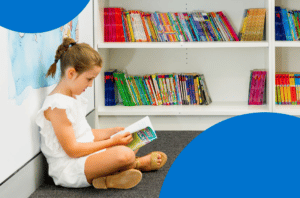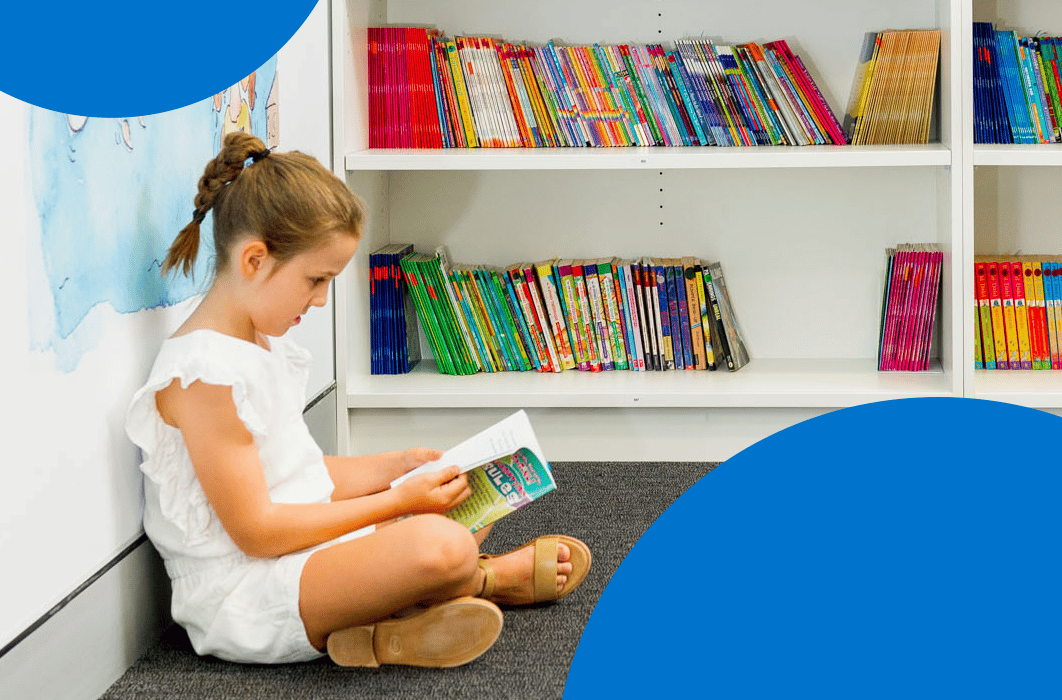Summer reading activities for children
The summer holidays are a magical time as a child.
Amongst the family parties, presents and adventures in the sun, it’s important to keep children reading through the long break from school. We’ve put together some tips, book recommendations and ideas for reading activities for children that will help get even reluctant readers practising their literacy skills this summer.

MultiLit Literacy Centre Assistant Manager – Macquarie Park, Melissa Day, says it’s crucial for early readers “to practise their skills, increase confidence, keep enjoying the adventures books contain and keep up the discipline of regular reading.”
“It’s a time where new routines can be negotiated,” Melissa continues. “Hopefully reading can be enjoyed differently over the relaxed holiday period.”
She recommends modelling that reading is a relaxing and enjoyable activity, so children can see you read for pleasure too, and asking other family members like grandparents, aunts and uncles to get involved.
Reading to your children is invaluable, as it allows them to sit back and enjoy the story, and gives them access to books, characters and adventures that are beyond their skill level.
“Talk about what has been read and what is happening so far in the story,” says Melissa. “Being read to continues to open their minds to lots of adventures, vocabulary, interesting concepts and learning opportunities. It is quality time well spent in every way!”
More tips for encouraging happy young readers
- Choose the right books – Find stories at the right reading level that match your child’s interests and cover a variety of genres, themes and topics to keep things interesting. Summer holidays are a great time to give children a choice in what they read, as they aren’t being told what to read at school and love a chance to make that choice for themselves.
- Head to the library – Libraries are perfect for letting children find and choose their own books, without having to shell out extra money. Spend time reading together, looking at books, and ask the librarian what they recommend.
- Gift books for Christmas – Books make the perfect present for birthdays, Christmas and other holidays. If someone gifts you a book, show how excited you are to receive it.
- Have family reading time – Quiet time where the whole family is reading can help establish positive, relaxing associations with reading. Make sure children can see that everybody is reading at the same time.
- Read somewhere different – Take family reading time out into the garden, at a picnic, or even inside a blanket fort.
- Make buying a book (or even just reading) a treat or reward – Go to the bookshop together! “I always started the holidays by going to the bookshop,” says Melissa. “Everybody chose and bought a book, signalling a fun start to the holiday.”
- Set a reading goal or challenge – A goal can help you all stay on track. Getting involved in making a tick chart and keeping track themselves gives children a sense of ownership over their reading. Your goal could be about how many books they read a day or over the entire holidays, how many different types of books they read, or to read in lots of different locations. At the end of the challenge, reward them with a prize, like a new book!
- Make reading a fun part of every day – One-on-one reading time between a child and a parent can be very special. Snuggle up and make it a time for just the two of you.
- Do some ‘tag’ reading – Take turns reading aloud with your child, swapping each paragraph or page. “This keeps the action moving and is a chance to model smooth reading, pace and expression,” says Melissa. “All the things we want the child to bring into their own reading.”
- Ask your child to “read this to me” – Encourage children to read everyday things, like menus, street signs and maps. Children love the chance to be grown up and help, and it allows them to use their literacy skills in the “real world”.
- Get stuck into a series – A gripping adventure can have children eager to know what happens in the next instalment.
Reading and writing activities for children
- Cooking – Look through a cookbook (try the library if you want something new) and make one of the recipes together.
- List making – Children could write out a list of things they want to do over the holidays, all the food they want to eat, or keep track of all the animals they see over the break. If you’re going on a trip, help your child research where you’re going and ask them to make a list of things they can do and what they need to pack.
- Scrapbooking – Encourage children to keep a journal or make a scrapbook of their summer holidays. They can write about or draw the things they get up to each day and add souvenirs and photos.
- Summer word jar – Fill a jar with fun, age-appropriate vocabulary words and have your child pull a new word from the jar every day. Have a contest to see who can use the word in context the most times throughout the day. Silly examples encouraged!
- Read the book, see the movie – It’s fun to see characters and adventures we read about come to life on the screen. After watching, talk about what they liked best about the book and the movie, or what was different to how they imagined.
- Spend five days exploring one book – Delve deeper into a picture book in your home library with five days of reading activities.
Here’s some of our favourite summer picture books for younger children.
Little Dog and the Summer Holiday by Corinne Fenton
Noni the Pony Goes to the Beach by Alison Lester
Two Mates by Melanie Prewett
When We Go Camping by Sally Sutton
You and Me, Murrawee by Kerry Hashmi
Grandpa and Thomas by Pamela Allen
Dotty McDermott was Fierce and Bold by Nicola Bell
Bessie the Bilby Needs a Friend by Anna Notley
The Song of the Billabong by Sue Murray

